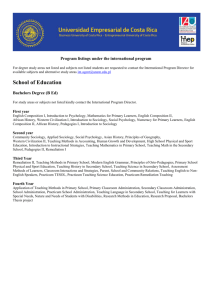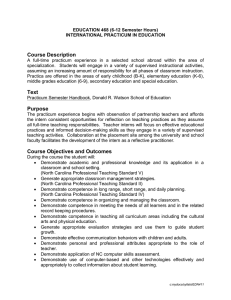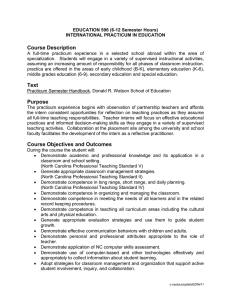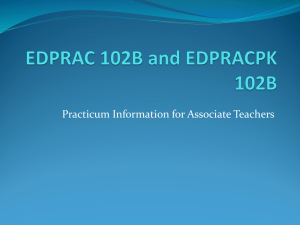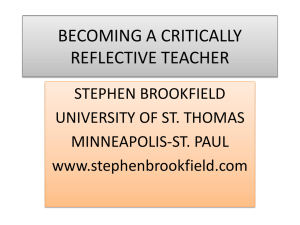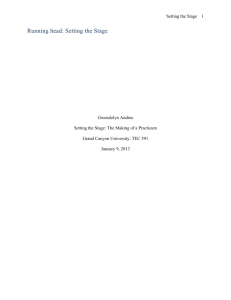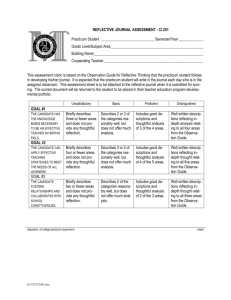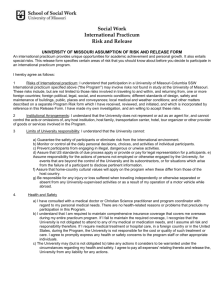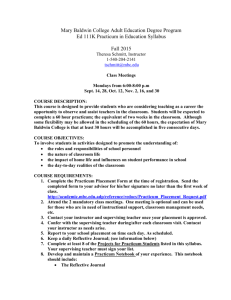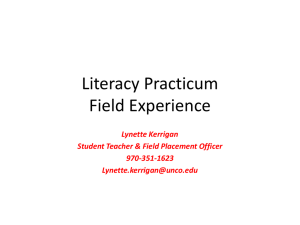EDPRAC 622 AT information
advertisement
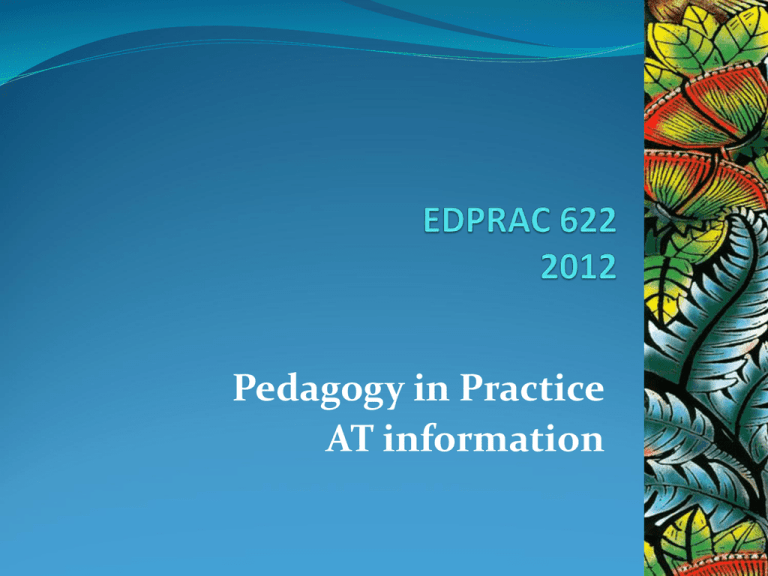
Pedagogy in Practice AT information Kia ora, kia orana, faka lofa lahi atu, namaste, sat sri akal, bula, talofa lava, malo e lelei, ni hau ma? salam, ayubowan, goedendag, hola, greetings. Whakatauki Nau to rourou, naku to rourou, ka ora te iwi. With your basket and my basket, together we will have enough. Thank you for welcoming a student teacher from the Faculty of Education teacher education programmes into your centre or kindergarten. We appreciate your support. Nga mihi nui, Debora Lee, Practicum Coordinator (ECE) (d.lee@auckland.ac.nz) “Teaching as an ethical enterprise goes beyond presenting what already is; it is teaching towards what ought to be” “Education is an arena of hope and struggle – hope for a better life and struggle over how to understand and enact and achieve a better world. We come to believe that we can become makers of history, not merely the passive objects of the great human drama” Bill Ayers Students have been asked to: Ring Associate Teacher and arrange a time to visit prior to practicum Prepare a one page profile Contact University Supervisor and share contact details Consider course work that will support practicum Prepare permission letter for assessment for children’s learning Practise reflective writing Policies and students Te Tiriti o Waitangi Consider responsibilities Child Protection What do they need to know? Health and Safety (eg name badges) What is required? Adhere to no smoking policies Positive Guidance What is expected of students? Student Teacher or specific centre expectations (eg competition issues) Philosophy Read and compare philosophy Assessment and planning for learning Professional Responsibilities 7.5 hours in centre Inform of absences Familiarise self with key policies Discuss and sign contract Name tags Work as member of teaching team Engage in teaching and learning process with children Demonstrate understanding of Te Whariki concepts and te ao Maori Meet NZ Teacher’s Council ‘Fit to be a Teacher’ criteria Utilise knowledge from University courses Professional Responsibilities Document involvement in teaching and learning Continue portfolio of evidence Engage in written reflection (three each week) Maintain contact with university supervisor Use ethical consent forms Professionally prepare and contribute to triadic process Reflect on Code of Ethics Work consistently towards meeting the Learning Outcomes Complete self-assessment form Resources to support students ECE Code of Ethics Tataiako; Guidelines for Positive Guidance; Quality in Action (available from www.minedu.govt.nz) Choices for Child Care (available from www.ecd.govt.nz) Moodle Practicum Portal (EDPRAC 622 word document) Resource Kit for Student Teachers: (akoaotearoa.ac.nz ) New Zealand Teacher’s Council Fit to be a Teacher Criteria trustworthiness honesty reliability sensitivity and compassion respect for others enthusiasm, dedication and imagination communication skills (includes ability to receive feedback) physical and mental health Portfolio Requirements With suitable permissions can include: Photographs and interpretive statements Learning stories, child’s voice, whanau voice Records and interpretations as demonstrations of your teaching Records of your involvement in meetings Evidence of communication with families, whanau and the wider professional community Graduating Teacher Standards Learning Outcome 1 Establish professional relationships and communicate competently with children, parents and colleagues and other members of the early childhood education community. 1.1 Appropriate communication within the full educational community of the centre is established and maintained consistently. 1.2 Equitable, inclusive and collaborative personal/professional relationships are effectively demonstrated with children, parents, colleagues and other members of the educational community. 1.3 Multiple ways of knowing learners in depth is evident in all interactions. Learning Outcome 2 Demonstrate a developing ability to practice effectively and contextually in complex and diverse early childhood settings. 2.1 a safe, purposeful and inclusive learning environment is effectively established and maintained in an appropriate manner 2.2 bicultural practices and diversity are addressed in an equitable manner when planning for learning 2.3 practice is informed by effective use of curricula and content knowledge, current assessment and planning processes and reflective practice 2.4 teaching and learning experiences are planned and implemented for individuals, small and large groups, and represents the range of curriculum areas studied on the programme 2.5 positive personal and professional responsibilities are demonstrated appropriately 2.6 personal qualities and dispositions identified by the Teachers Council ‘Fit to be a Teacher’ criteria are demonstrated consistently Graduating teachers know: know what to teach know about learners and how they learn understand how contextual factors influence teaching and learning use professional knowledge to plan for a safe, high quality teaching and learning environment use evidence to promote learning develop positive relationships with learners and members of learning communities are committed members of the profession Learning Outcome 3 Demonstrate an ability to integrate theory, research and practical experience in own developing pedagogical practice in early childhood education settings. 3.1 personal pedagogical practice in relation to the learning outcomes of this course is articulated and critically reflected upon in relation to theory and research studied 3.2 appropriate ways of teaching and learning are selected to suit diverse children’s interests, strengths, abilities and needs within the educational context that are theoretically and evidence-informed and able to be articulated and justified. Learning Outcome 4 Demonstrate understanding of the complex social, moral, political and ethical factors that impact on pedagogical practice. 4.1 Appropriate behaviour guidance strategies to enhance children’s social competence are ethically selected, effectively implemented and critically evaluated 4.2 Issues relating to social, cultural and political factors that impact on the teaching/learning process are considered when decision making in an informed manner 4.3 The ethical, moral and political dimensions of professional dilemmas are critically reflected upon, including reference to both the early childhood Code of Ethics and the New Zealand Teachers Council Code of Ethics Reflection DATA Brookfield’s critically reflective lenses Smyth’s Stages in Personal and Professional Empowerment DATA Describe Choose a specific incident or an aspect of practice. Analyse Look into the reasons for the occurrence. Theorise Explore alternative theories. Act Examine possible changes to practice. Brookfield’s Lenses Our autobiographies as learners and teachers Our student’s eyes Our colleagues’ experiences Theoretical literature Smyth’s Stages in Personal and Professional Empowerment Describing Informing Confronting Reconstructing (examples in practicum handbook) Overview of Associate Teacher Expectations Induct student teacher into centre/kindergarten environment Give weekly verbal and written feedback on progress Respond to reflective writing (3 each week) Support student teacher to attend 7.5 hours in centre each day, five days a week Document any concerns Keep in communication with university supervisor. Support the student teacher to work as a member of the teaching team (as closely as possible) Complete associate teacher assessment form before triadic assessment. Contribute to the triadic assessment process (DVD available)
